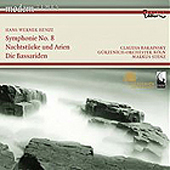
ESSENTIAL RECORDINGS

The epilogue to Matthew Boyden's Richard Strauss (London 1999) opens with the statement, "Richard Strauss was the last purely German composer." And Boyden goes on:
"The bitter irony of German music after Strauss's death was that while he had been gifted with a musical language intelligible to, and popular with, the majority, it was at
no point used to express anything to which the majority might tenably have related. Conversely, the composer Hans Werner Henze and his contemporaries were animated by
ethical questions of social and political relevance which they failed to express in music that the majority might enjoy."
And now we may perceive another irony of German music. Just nine years after Boyden's summary appraisal, Henze has had the mantle of, 'Grand Old Man of German Music'
thrust upon him. Having chain-smoked his way to octogenarian status and despite the fact that he has been in self-imposed exile for the past fifty-five years, it is now
a continental musical case of Henze über alles. A concise explanation of how and why this came to pass can be found in the disc under consideration here.
Markus Stenze presents a selection of the composer's output between 1957 and 1993. This is an ideal introduction for collectors previously unacquainted with Henze and one
which will also allow dedicated admirers to complete the recorded cycle (from various sources) of his ten symphonies.
If enough of his music is given due and careful attention, a few facts about Hans Werner Henze's compositional abilities can be deduced. First: he can create music in any
style that takes his fancy. Second: Henze composes with the same fierce sincerity with which he expressed (and demonstrated) his convictions on social and political issues.
There is no scope for prevarication in either his ideals or his scores. Third: he has a marvelously subtle sense of humour. And fourth: the melody is the man and the man
is the melody. The biographical element is as omnipresent with Henze as it was with Strauss.
Nachtstücke und Arien represented the composer's withdrawal from Darmstadt dodecaphony. Pierre Boulez and Karlheinze Stockhausen both walked out of the first
performance as soon as they realized that the opening horn cantilena was sublimely beautiful music. Two arias (text provided without translation) are inserted
into a night music triad. It is a ravishing composition with a core of great tensile strength. Die Bassarids was written for the Salzburg Festival of 1966.
Four decades later, Christoph von Dohnányi persuaded Henze to prepare an orchestral suite from the score. The result is the equivalent of a four-movement symphony.
And it is a symphony of quality, too. The latest composition featured here is Symphony No 8 which was first performed in 1993. Henze took his inspiration from
Shakespeare's A Midsummer Night's Dream and the three movements are musical illustrations of key scenes in the play. After hearing the formal rigors of
his Seventh and the sound and fury
signifying something' of the Tenth, it is an approachable and rewarding work.
Markus Stenze has become a leading exponent of the music of HWH. He draws superb performances from the Cologne orchestra. Henze needs to be heard and his unique
genius recognized and Stenze succeeds admirably. Sound quality is decent, if a little shallow. For a further impressive Henze/Stenze collaboration, check out the
EuroArts opera DVD of L'Upupa und der Triumph der Sohnesliebe from the 2003 Salzburg Festival.
The Phoenix is rising. Phoenix Edition is new to North American distribution and the initial offering of releases has been impressive. In modern music, a disc
of the piano concertos of the late Alfred Schnittke can also be highly recommended. It features pianist Ewa Kupiec with keyboard support from Maria Lettburg and the
RSO Berlin under Frank Strobel. Phoenix Edition 103 is a Hybrid SACD. Schnittke's music provides a sharp contrast to the eclectic style of Henze but is no less worthy
in these exciting performances.
Stephen Habington